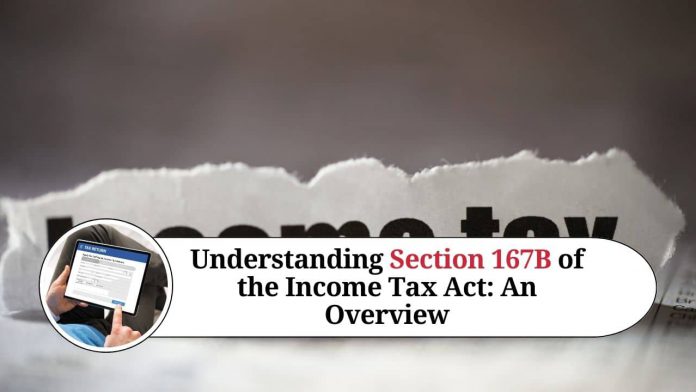The Income Tax Act is a complex piece of legislation that contains various sections and provisions, each with its own implications for taxpayers. One such section is 167B, which deals with the taxation of income earned by non-residents in India. In this blog post, we will provide an overview of section 167B and its key provisions.
Definition of Non-Resident
Firstly, it is important to understand who is considered a non-resident under the Income Tax Act. According to the Act, an individual is considered a non-resident if he or she has spent less than 182 days in India during a financial year, or if he or she has spent less than 60 days in India during a financial year and less than 365 days in India during the preceding four financial years.
Taxation of Non-Resident Income
Section 167B of the Income Tax Act deals with the taxation of income earned by non-residents in India. Under this section, non-residents are liable to pay tax on any income that is received or deemed to be received in India, or that accrues or arises or is deemed to accrue or arise in India.
The section also covers income earned by non-residents from sources outside India, but which is received in India. In such cases, the income is deemed to have been received in India and is therefore subject to taxation under section 167B.
Tax Rate and Deductions
The tax rate applicable to non-resident income is typically higher than the tax rate for residents. As of the current knowledge cutoff date of September 2021, the tax rate for non-residents ranges from 20% to 30%, depending on the nature of the income earned.
However, non-residents are also eligible for certain deductions and exemptions under the Income Tax Act. For example, they can claim deductions for expenses related to earning their income in India, such as travel and accommodation expenses. They may also be eligible for exemptions under India’s Double Taxation Avoidance Agreements (DTAAs) with other countries.
Withholding Tax
One important aspect of section 167B is the requirement for withholding tax on non-resident income. This means that if an Indian resident makes a payment to a non-resident that is subject to tax under section 167B, the resident must withhold a certain percentage of the payment as tax and remit it to the Indian government.
The withholding tax rate varies depending on the nature of the income earned by the non-resident. For example, the rate is typically 30% for income earned from dividends and interest, while it is 10% for income earned from royalties and technical services.
Conclusion
Section 167B of the Income Tax Act is an important provision that governs the taxation of non-resident income in India. Non-residents who earn income in India or receive income in India from sources outside the country must be aware of their tax obligations under this section, including the applicable tax rate, deductions, and withholding tax requirements. Failure to comply with these requirements can result in penalties and legal consequences, so it is important to seek professional advice to ensure compliance with the Income Tax Act.
Other Related Blogs: Section 144B Income Tax Act
Frequently Asked Questions (FAQs)
Q.1 What is section 167B of the Income Tax Act?
Section 167B is a provision in the Income Tax Act that deals with the taxation of income earned by non-residents in India. It outlines the tax rates, deductions, and withholding tax requirements that apply to non-resident income.
Q.2 Who is considered a non-resident under the Income Tax Act?
An individual is considered a non-resident if he or she has spent less than 182 days in India during a financial year, or if he or she has spent less than 60 days in India during a financial year and less than 365 days in India during the preceding four financial years.
Q.3 What types of income are subject to taxation under section 167B?
Non-residents are liable to pay tax on any income that is received or deemed to be received in India, or that accrues or arises or is deemed to accrue or arise in India. This includes income earned from sources outside India that is received in India.
Q.4 What is the tax rate applicable to non-resident income?
As of the current knowledge cutoff date of September 2021, the tax rate for non-residents ranges from 20% to 30%, depending on the nature of the income earned.
Q.5 Are non-residents eligible for any deductions or exemptions under the Income Tax Act?
Yes, non-residents may be eligible for certain deductions and exemptions under the Income Tax Act. For example, they can claim deductions for expenses related to earning their income in India, such as travel and accommodation expenses. They may also be eligible for exemptions under India’s Double Taxation Avoidance Agreements (DTAAs) with other countries.
Q.6 What is withholding tax?
Withholding tax is a mechanism for collecting tax at the source of income. In the context of section 167B, it refers to the requirement for Indian residents to withhold a certain percentage of payments made to non-residents that are subject to tax under this section and remit it to the Indian government.
Q.7 What is the withholding tax rate applicable to non-resident income?
The withholding tax rate varies depending on the nature of the income earned by the non-resident. For example, the rate is typically 30% for income earned from dividends and interest, while it is 10% for income earned from royalties and technical services.
Q.8 What happens if a non-resident fails to comply with the requirements under section 167B?
Failure to comply with the requirements under section 167B can result in penalties and legal consequences, such as fines, interest, and prosecution. It is therefore important for non-residents to seek professional advice and ensure compliance with the Income Tax Act.




















